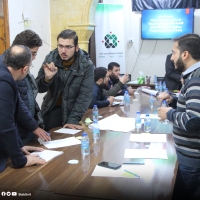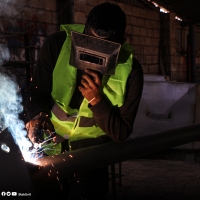Within the activities of “The Voice of the Local Community in the Constitution” project, the Stabilization Support Unit, held the Forth workshop in the city of Jarablus on 8/1/2020, in participation of the representatives of the Free Aleppo Provincial Council, local councils, the Independent Syrian Kurds Association, the Turkmen National Council, Civil Society Organizations and local community leaders from all the components of the community in Jarablus City, to represent the widest possible segment of the population in the city, as more than half of the population are composed of those who are displaced from Damascus countryside (Rif-Dimashq), Homs, Deir ez-Zur, Raqqa, and Manbij .
The workshop aimed at providing an explanation of the constitution, its importance, and the political paths in Syria, the Constitutional Committee and how it was formed. Also, during the workshop, focused discussion groups were formed to discuss and exchange views, visions, and ideas to reach to the common points between participants – the common points that will be discussed more extensively in an upcoming workshop which will be held in presence of members of the Constitutional Committee (the opposition delegation) to communicate and convey the opinions and aspirations of the local community within Syria regarding the constitution to the constitutional committee.

The workshop consisted of three sections :
1- The first section: a briefing and explanation of the constitution, its importance and the political
processes related to Syria from Geneva to the formation of the constitutional committee and
comparison between constitutional experiences of other countries.
2- The second section: Clarification on the constitutional committee and its importance, the role of the
community and its importance in shaping the constitution, constitutional experiences of other countries,
and comparing them with the Syrian situation
3- The third section: Individual and group questionnaires to get the opinions of the participants about the
Constitutional Committee, the constitution and the form of the government.

The enthusiasm/interest of the participants was evident/clear from the beginning of the workshop.
Immediately after the welcoming phase, the participants began asking their questions and inquiries about
the Constitutional Committee and the concerns they have on the work of the Constitutional Committee and
the constitution before the actual start of the activities of the workshop. From their questions and
interventions; the false information they have and their misconception about the Constitutional Committee
was clear due to the negative rumors circulated about the Constitutional Committee – one of the
participants said: “The constitution is molded and is in the interest of the Regime.” Another pointed out,
“All the members of the Constitutional Committee have been chosen by the regime and the regime can
issue decisions as it wishes.” A female participant said, “What is happening is not negotiations or writing a
constitution, but rather a settlement with the criminal regime.”
The facilitator of the workshop clarified that all the points that were mentioned by the participants will be
explained, and after that, there will be a time for discussions and inquiries.
Then the video that was produced by the Stabilization Support Unit about the constitution, its importance and the
ways of the forming constitution was presented/shown.
Click the picture below to watch the video with English Subtitles:
After the video was shown, explanation was made through a presentation on the political baths in Syria and
its development, starting from the Geneva bath and its start with the first Geneva conference and the
statement issued by it and its impact on the Syrian political solution to the Astana conferences and Security
Council Resolution / 2254 / and the formation of the Constitutional Committee.
And it was made clear that the Constitutional Committee’s reference authority is the relevant Security Council and United Nations resolutions.
Click the photo for the presentation used in the workshop

After that, an explanation was made on the Constitutional Committee and its structure, the total number of its
members and its Minimized Committee, the mechanism of decision making in it and where its works reached .
After that, there were discussions/explanations about the constitutional experience in Tunisia (which gained the
world’s admiration), how civil society, through its organizations, unions, and federations, managed to communicate
the voice of society and participate in shaping up the constitution and regime of government in the country. And the
Lebanese experience, the constitution that formed after the civil war, where the sectarian distribution of
positions/powers was adopted, which in turn affected all aspects of life in Lebanon .

And then the door opened for discussions among the participants, the opinions differed – there were participants
who believed that the difference is significant between the Syrian and Tunisian experiences in terms of political and
military circumstances, and others said that there is difficulty in Syria case due to the absence of political parties and
the weak role of civil society organizations or their lack of experience. On the other hand, one of the participants saw
that it is not possible to negotiate with the regime because it has no legitimacy because of the crimes it committed
against civilians, including bombing and displacement.
The thing that all the participants agreed on is that the Syrian people inside Syria do not have a clear understanding
about the Constitutional Committee and have no idea about the work the constitutional committee does at the
current time because of the lack of the communication channels with its members and the rumors spread about it.
The workshop, through its sections, provided an extensive explanation and removed a lot of ambiguity that was
marring the image of the Constitutional Committee. The participants now are looking forward to meeting the
members of the Constitutional Committee in subsequent workshops.
Here are some of the documents and presentations used by Stabilization Support Unit and distributed to the
participants to explain the political paths regarding Syria (Astana Path reaching to Sochi – Geneva Path reaching to
the Resolution 2254 and an introductory brochure about the constitution, the constitutional committee and the four
baskets of Staffan de Mistura ).
In the last section of the workshop, a questionnaire was conducted to solicit the participants’ opinions. The following
questions distributed to the participants discussed and answered first individually and then as groups after dividing
the participants into working groups.
Here are the questions:
1- What are your concerns, remarks, recommendations on the work of the Constitutional Committee
(formation, mechanism of work and procedures, etc.)
2- Do you have any hopes, aspirations, from the work of the Constitutional Committee?
3- What do you think, how should the regime in Syria be?
4- In your opinion, how should the presidency be in Syria? (Sex – Nationalism – Religion and Doctrine – Duration
of Mandate – Powers … etc)
5- What are the merits that we must adhere to/stick to in the upcoming constitution of Syria?
6- If the Constitutional Committee agreed on a draft constitution, (and conditions allowed for participation)
would you participate in the constitutional referendum process?
After that, each group provided an explanation of the opinions that were agreed upon by each of them. Below
is a summary of those opinions.
After that, each group provided an explanation of the opinions that were agreed upon by each of them. Below
is a summary of those opinions.

Regarding the Constitutional Committee, some
saw that there is ambiguity in its formation and the
method adopted to select its members and that they
(the members) were chosen by the influential
countries in Syria issue and they see that the
members should have been selected from those
who are inside Syria

- The opinions varied in terms of the form of the
regime in Syria (Parliamentary, presidential,
republican…).

- One of the groups pointed out the necessity of
guaranteeing the rights of women and minorities
and their participation in the Parliament through
legislations guaranteeing their fair representation.
- One of the most important merits that should be adhered to/stuck to (which was important for and mentioned by the majority) is the achievement of social justice and holding war criminals accountable.
Click the image below to which the video that Stabilization Support Unit has prepared about the workshop.


